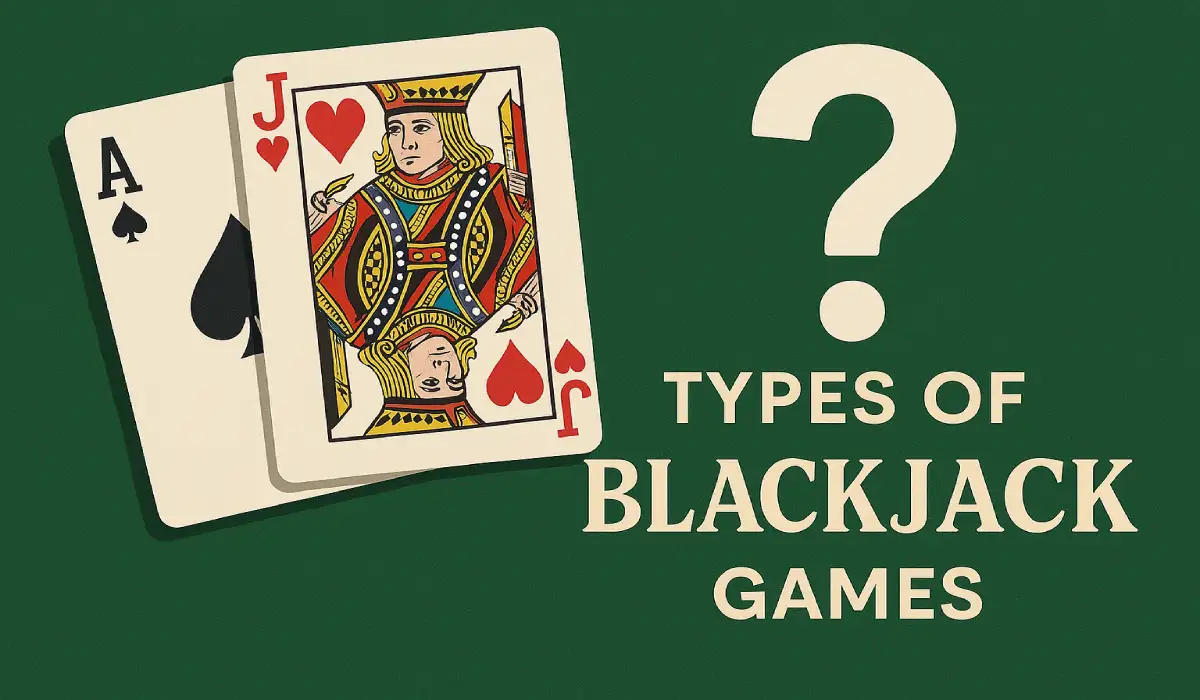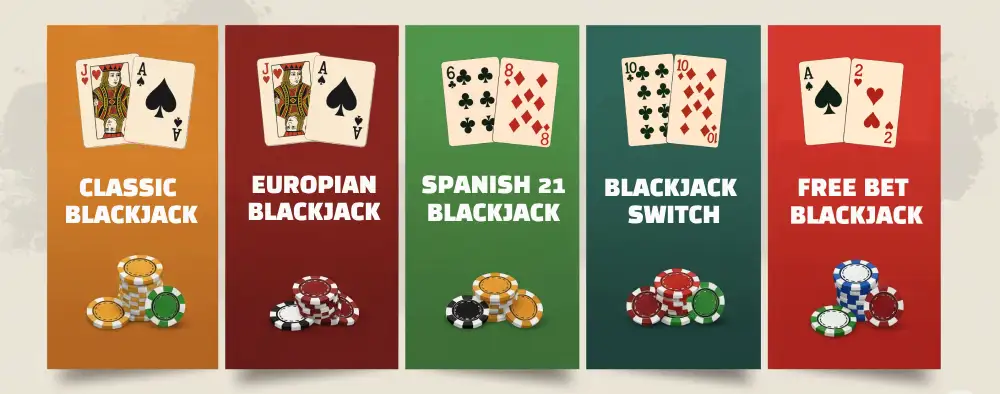
Types of Blackjack Games: Understanding the Variations
🗝️ Key Takeaways
- The diversity of blackjack games is due to casino innovation and player demand for it to have something for every level and taste.
- Knowing the basic rule differences, like dealer actions, number of decks in play, and payout structure, is key for crafting winning strategies.
- Online has made the various types of blackjack broader and more available, with special features such as live dealer and side bets to customers around the world.
- Each type, ranging from Classic blackjack to European blackjack to Spanish 21 to Blackjack Switch to Free Bet blackjack, offers unique rules and strategies that you should learn before playing.
- By adjusting your strategy accordingly, considering not only house edge but your own playstyle and smart bankroll management, you can maximize your odds of long-term success within any type of blackjack.
- To discover their ideal match, players ought to sample several variants, weigh their gameplay habits, and continue to experiment as new blackjack styles are introduced.
Blackjack comes in various game styles that follow the same fundamental rules but introduce changes to house rules, side bets, or payout ratios. Let’s face it, most players learn classic blackjack — aka 21, where the objective is to hand outpace the dealer without busting over 21.
There are other types, like European Blackjack, Spanish 21, Pontoon, and Double Exposure, all with their own slight variations, such as how many decks the game uses or when you’re allowed to split or double down. Certain varieties include side bets, others modify when the dealer hits.
To assist you in selecting the best version for your gameplay, this post provides an overview of the most popular types of blackjack and their differences.
🎲 Why So Many Blackjack Games?
Blackjack continues to be one of the world’s favorite card games. However, its charm is not limited to the traditional style.
So why are there so many blackjack games to choose from these days? Variants come with their own rules, new side bets, and inventive promotions, all of which impact the way the game is played and enjoyed.
💡 Casino Innovation
Casinos maintain player interest by adjusting base rules. For instance, some games pay 6 to 5 instead of 3 to 2 on blackjack, which increases the house edge by roughly 1.4%.
Some let you hit split aces or resplit aces, which reduces the house edge just a little. These minor tweaks turn out to be game-changing — for players and casino revenue both.
Themed blackjack games (like New Year's 31) have a different card limit and special rules—31 instead of 21, sometimes a 14 beats a 30. They attract new crowds who are looking for something different, not just old-school gameplay.
Technology has enabled casinos to display digital tables with side bets, progressive jackpots, and bonus rounds. Promotions, like tournaments or short-term rule alterations, frequently spark new blackjack varieties, ensuring the game remains fresh and thrilling.
🎯 Player Demand
Players mold the blackjack game. Their feedback results in rule tweaks, like allowing players to double down post-splits or modifying when the dealer has to hit or stand.
These tweaks may help the game stay popular with a broader audience, particularly as the newer generations start dealing. Game features such as surrender options or blackjack insurance bets become popular when players demand more agency.
Demographics count. Younger players, for example, might like faster games or side bets, which makes casinos evolve and develop new versions.
🌐 Online Influence
Online casinos have transformed blackjack by providing dozens of variations at the click of a mouse. Players could now find single-deck, double-deck, and multiple-deck games, each affecting strategy and odds.
For instance, card counting is more effective with less decks, but online tables are usually six to eight decks, which makes counting more difficult.
Online play = more convenience + more choice. Special side bets and live dealer games have become the norm, allowing gamblers to have a nearly authentic casino feel from the comfort of their couches.
Live dealer tables, in particular, close the divide, providing live play with human interaction.
⚖️ The Core Rule Differences
Blackjack variants vary by fundamental rules that impact the house edge and player strategy. These rule differences impact the house edge, player choices, and optimal strategies.
Knowing the ins and outs of each version is key for anyone looking to play smarter. Most players assume all blackjack games are the same, but small rule changes can cause huge shifts in results.
Before you select a table or online version, review the rules—familiarizing yourself with them can keep you out of expensive trouble. Think of it like building your own cheat sheet to avoid costly mistakes.
🃏 Dealer Actions
Dealer’s decisions influence the game’s pace. One critical rule is if the dealer stands or hits on a soft 17. Most players don’t realize that if the dealer HITS on SOFT 17 (H17), the house edge increases by approximately 0.22%.
If the dealer stands (S17), the edge falls by about 0.2%. These little steps alter your play, particularly when hitting or standing against the dealer’s upcard.
| Rule | House Edge Impact | Player Benefit |
| Dealer hits S17 | +0.22% | Favors casino |
| Dealer stands S17 | -0.2% | Favors player |
| H17 to S17 switch | -0.2% | Better odds |
Players aware of the dealer’s hit/stand rules can adapt their hard-hand strategy. For instance, hitting on soft 17 ups the dealer’s chance to bust, but to get a stronger hand.
Knowing these rules will help you make the best moves and will give you a minor advantage over those who don’t.
♠️ Deck Count
Deck count is a huge issue in blackjack. Single-deck games tend to have much lower house edges and are easier to count cards on. Piling on more decks (as in the 4, 6, and 8 deck versions) increases the house advantage and diminishes the usefulness of card counting.
For instance, a double-deck game boosts the house edge by approximately 0.19%. As mentioned above, most casino games employ six or eight decks, but online and European games can differ.
GMs and players should know that strategies change with deck count. Card counting is more valuable in single- or double-deck games.
With more decks, traditional basic strategy gets even more crucial. Typical deck counts include 1, 2, 4, 6, or 8 decks.
🎮 Player Options
- Split pairs: Lets you play two hands and lowers house edge if done right.
- Double down: Boosts winnings on strong hands, but some games ban it after splits.
- Resplit aces: Increases chances, lowers the house edge by 0.03% to 0.08%.
- Surrender: Lets you give up a bad hand and lose only half your bet.
- No double after split: Raises house edge by about 0.14%.
Various blackjack variants allow players to apply these actions in varying manners. For instance, European rules won’t allow you to double down after you split.
Understanding what’s permitted in your play style lets you make smarter decisions and squeeze out more victories. Figuring out when to use each is about more than fortune.
It’s about reading the table rules and applying the right move at the right time—think of it as following a practical strategy guide.
💰 Payout Structures
- 3:2 for natural blackjack: Standard, best for players.
- 6:5 or 1:1: Lowers player payouts, raises house edge.
- Even money: Same as 1:1, less favorable.
- Insurance: Usually a bad bet, raises house edge.
Games that pay 3:2 for a natural blackjack offer the best odds. Lower payouts like 6:5 make the game much tougher. Be sure to look up the payout rate before you play.
Payouts are important as they alter both your winnings and optimal betting.
In natural blackjack (Ace + 10’s) payouts are the key. The higher the payout, the more favorable it is for the player.
🔍 What Are the Main Types of Blackjack?

Blackjack has developed into multiple types, influenced by regional and rule variations. These versions are good to understand so players can select games that best fit their style and strategy guide requirements.
Classic blackjack is the most familiar variant, with simple rules and around a 42% chance to win. It employs one or more standard 52-card decks.
Players seek to outperform the dealer by striving to reach a value closer to 21 without exceeding it. Newbies dig the simplicity, and experts love the odds and strategy.
Classic blackjack forms the foundation for the majority of other variations, so it’s a solid entry point to learning the game’s basics.
1. Classic
Classic blackjack’s rules are simple: players receive two cards, can hit or stand, and win by outscoring the dealer without busting. Its attraction is universal, captivating the novice and the avid player alike.
This incarnation spawned the multitude of blackjack versions — such as Pontoon in the UK, Vingt-et-un in France, and Siebzehn und Vier in Germany. Its simple rules and typical use of a single or multi-deck shoe make the play easily approachable and quick.
2. European
European blackjack is quite different from the American version. The dealer only receives one card face up, to begin with – no hole card.
This rule affects strategy because players can’t know if the dealer has blackjack until after players make all their decisions.
European blackjack typically has two decks, which influences the odds and strategies for card counting. With double down restrictions and the occasional limitation on splitting aces, this variant rewards those players willing to adjust their play.
A lot of players opt for European blackjack because of its distinct tactical requirements and the appeal of making decisions with less information.
3. Spanish 21
Spanish 21 takes all the 10s out of the deck, altering the odds and tactics. Players get to surrender at any point as well as have additional payouts for specific hands.
It features “match play,” in which matching the dealer’s upcard pays bonuses. With less high cards in the mix, players can leverage flexible rules—like late surrender and bonus payouts—to reduce the house edge.
Spanish 21 appeals to players wanting a variation on traditional play, with additional opportunities for inventive action.
4. Blackjack Switch
Blackjack Switch enables you to play two hands and switch their top cards. This mechanic adds fresh strategy and flips bad hands.
A natural blackjack pays less—usually 1:1 instead of 3:2. Players into deep strategy may find Blackjack Switch rewarding, as the switch rule mandates advanced hand analysis and risk management.
5. Free Bet
Free bet blackjack offers players free double downs and splits, minimizing risk and intensifying excitement. The special bet structure attracts players who desire more action with less risk.
House edge is countered by rules like pushing on dealer 22. For players seeking less risk and more decision points, Free Bet blackjack is a great choice.
♟️ The Strategic Impact
Blackjack variants may seem similar, but game rules, house edge, and playstyle requirements change the strategy for each. Knowing these things is non-negotiable if you want to play clever and keep losses under control.
Game versions such as Classic, European, or Spanish 21 have their own variations. Every variation–single versus multiple decks, dealer hits or stands on soft 17, resplitting aces–influences your strategy on how you play, bet, and bankroll.
A good understanding of these distinctions keeps you nimble, allowing you to modify your strategy for optimized probability and sustainable play.
📊 House Edge
House Edge tells you how much the casino expects to win in the long run as a percentage of each bet. In Blackjack this number varies with the rules. That is, unless the dealer hits on soft 17 (H17), in which case the house edge increases by approximately 0.22%.
If you can double after split, the edge drops by around 0.14%. Mastering fundamental strategy cuts the margin to about 0.5% in decent rules—a massive victory for the player.
They may sound minor, but over thousands of hands, they accumulate and can save or lose you a ton.
| Variant | House Edge (%) |
| Classic Blackjack | 0.5 |
| European Blackjack | 0.7 |
| Spanish 21 | 0.4 |
| Atlantic City | 0.35 |
| Double Exposure | 0.7 |
Choosing games with a smaller house edge is clever. Players aware of these figures can hedge their wagers, risk less, and extend their budget.
Knowing how rules like surrender or resplitting aces alter the math allows you to identify the best tables and steer clear of expensive errors.
🔥 Your Playstyle
Selecting a blackjack variation that suits your playing style matters. Others go for broke, doubling down a time or two, or splitting pairs for greater returns.
Others err on the side of caution, placing less risky bets and playing small ball. The optimal version is a function of your interests and risk tolerance.
For instance, Spanish 21 usually attracts the risk-takers, whereas Classic Blackjack benefits the steady player. To maximize any game, tailor your style to the table.
If the rules allow you to double on any number of cards, aggressive players might have more space to succeed. If the variant restricts choices, fall back on fundamental strategy and search for incremental advantages.
💵 Bankroll Management
Good bankroll management extends your play and curtails losses. Establish a firm budget prior to your play, and divide your bankroll into bite-sized wager chunks.
In games with a low house edge, your bankroll lasts longer if you stick to smaller bets and avoid chasing losses by doubling up. Always tailor your bet size to the table limits and the variant’s variance.
A disciplined approach enables you to leave the table with more in your pocket and less stress.
🧠 The Philosophy Behind Variations
Blackjack is not a single game. It’s a philosophy, a bundle of decisions guided by casinos and players alike.
These variations all stem from the desire to maintain fairness, entertainment, and profitability for the game. Rule tweaks—such as the payout for blackjacks or whether you can split aces—modify the likelihoods, the expertise required, and the entire feel.
🎯 The Casino's Goal
Casinos create new blackjack variants to keep players engaged and at the tables longer. They hunt for corners to make games compelling without exposing their own advantage.
For instance, moving from the traditional 3 to 2 payout to a 6 to 5 payout increases the house advantage by approximately 1.4%. That’s more house profit, no matter how subtle that switch might appear.
The same goes for insurance bets or rules like dealer hits soft 17 (H17) vs. Stands on soft 17 (S17), which can swing the house edge by 0.2%.
Player comments inform these rules as well. Casinos observe what players like or what seems equitable and tweak it.
More variants, more small rule tweaks, all helps them to reach more people, from novices to professional card counters. If players are allowed to resplit aces or hit after splitting, these modifications are occasionally included.
With each new feature, there’s a watchful eye on the house’s profits.
✨ The Player's Opportunity
Players get an actual opportunity to apply skills at Blackjack. Rule changes can move the game from random to something you can master with the correct approach.
For instance, the ability to split aces reduces the house edge by 0.13%. That flexibility allows rule-savvy players to make more intelligent decisions — and perhaps win more.
Experimenting with variations allows gamers to discover the blend that fits them best. Some crave additional risk, others desire more opportunities to apply skills, such as card counting, which can invert the house advantage by as much as 2% for the player.
Every variation requires a somewhat different methodology. Adaptable players can fare better.
Knowing the impact of every rule—such as “player loses 17-20 ties” reduces the house edge by -8.38%—provides players a genuine upper hand.
✅ How to Choose Your Game
Choosing your blackjack game is about considering your ability, objective, and desires. It would help to consider the rules, decks, and house edge.
Other variants have rules that provide higher odds, such as allowing double down on any two cards or frequent splitting. Figuring out what suits you—easy enjoyment, serious strategy, or an element of danger—helps simplify the decision.
🕹️ For Casual Fun
If you’re here for light play, Classic Blackjack is your sure thing. It makes life simple. European Blackjack is soft, with its leisurely pace and easy maneuvers.
These editions make it less stressful and more on the enjoyable side. What casual players care about is not a big win but time on and comfortable play. Low minimum bets and less rule-convoluted games take the pressure off.
That makes them great for parties, pals, or anyone wet behind the ears at the table.
📊 For Serious Strategy
If you want to play skillfully and strategically, opt for games such as Blackjack Switch or Spanish 21. These provide additional choices, such as the ability to surrender or split frequently and reward those who understand the strategies.
American Blackjack, with its split and double-down rules, is another top choice for strategy enthusiasts. Getting the specifics can assist in minimizing the house edge.
A few games use less decks, so card counting is simpler.
Veterans will want to peruse each game’s instructions before taking a seat. The more you know, the greater your chances.
Certain variants permit advanced strategies, such as double after a split or late surrender. These tiny rules can tweak your decisions every round and unlock more avenues to victory as the game progresses.
🌐 Online vs. Live
Online Blackjack has quick games, hundreds of rules sets, and convenient access. Play anywhere, select low or high stakes, and test out bonus feature versions.
These tend to be welcome bonuses and side bets.
Live Blackjack provides a social element, with a dealer and fellow players. For others, barking at the table is half the excitement.
It’s more intimate, and the tempo is more relaxed, which others crave.
🚀 Explore and Experiment
- Trying many blackjack types is smart.
- Each variant offers a new way to play.
- Keep an open mind.
- You may find a favorite.
🔒 Conclusion
Blackjack offers an incredible amount of options to the players. Some games utilize a single deck, and others might employ as many as eight.
Some allow you to split hands, others not. House rules change your strategy and your winnings.
To locate a fit, consider rules, payouts, and the speed of the game. Experience the real thing with classic Blackjack.
Now, if you want a twist, go for Spanish 21 or Pontoon. Every game requires a fresh strategy and a clear mind.
Know the rules before you begin. Try a few types to find what works best for you.
Stay with new games and modifications. Indulge your wins and tips with others.
Make inquiries and assist the following player learn.
Frequently Asked Questions❓
What are the main types of Blackjack?
Some of the primary types are Classic Blackjack, European Blackjack, Atlantic City Blackjack, Spanish 21, and Blackjack Switch. Each has slightly different rules that can impact your strategy and odds.
Why do different types of Blackjack exist?
Various types provide variety, local flavor, and new challenges. Casinos innovate new versions to keep the game fresh for players across the globe.
How do rule changes affect blackjack strategy?
Rule changes, like how many decks or if the dealer hits on soft 17, will alter your optimal strategy. Just make sure you always check the rules before playing so you can tailor your strategy and increase your odds.
Which blackjack type offers the best odds?
Classic Blackjack with good rules tends to have the best odds. The house edge varies, so seek out games that use fewer decks and player-friendly rules for your best shot at winning.
Can I use the same strategy for all blackjack types?
No, various kinds will require various strategies. For instance, Spanish 21 eliminates all 10s from the deck, meaning that the basic strategy is different. BEING AWARE OF THE RULES: Learn the rules before you play.
How do I choose the best blackjack game for me?
Think about your skill level, favorite rules, and payout rates. If you're a newbie, begin with Classic Blackjack. Feeling fancy? Try Spanish 21 or Blackjack Switch.
Is Blackjack popular worldwide?
Indeed, Blackjack is played in casinos and online around the globe. It's easy to follow rules and thrill of play have made it a favorite among many players worldwide.





























